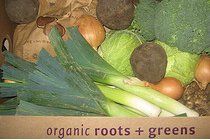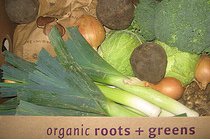UK organic food sector is bottom in Europe report shows
The UK Government has failed to support and promote the organic food and farming sector, according to a new report from the Soil Association.

 The UK Government has failed to support and promote the organic food and farming sector, according to a new report from the Soil Association.
The UK Government has failed to support and promote the organic food and farming sector, according to a new report from the Soil Association.
“The Lazy Man of Europe”, launched today (10 February) at the Soil Association’s annual conference in Manchester, highlights that Britain is at the bottom of the league when it comes to support for the sector, and fails to meet the standards of the rest of Europe.
It claims that this led to a slump in organic food and drink sales during the recession. Other major European organic markets successfully weathered the storm.
When it comes to thinking in a truly sustainable way about the future of food and farming, successive UK governments have been diffident, if not lazy, states the Soil Association. The UK lags at, or near, the bottom of every European league table for investment in organics, it adds.
‘Foodspin’ from firms, whose interests oppose organic food and farming practices, may also contribute to the approach the Government and food producers take to the food industry.
Foresight Communications, a lobbying firm with political links, produced a report on 24 January, which endorsed technology such as genetic modification (GM), as a way of reducing the impacts of climate change and increasing food security.
The report, "Global Food and Farming Futures", stated that genetically modified organisms (GMO's), cloned livestock and nanotechnology should not automatically be excluded on ethical or moral grounds.
Technological areas advocated by Foresights include precision agriculture to reduce the volume of fertiliser applied to crops, plant breeding to improve their nitrogen use, and genetically improving the fodder for beef and dairy cattle to reduce greenhouse gas emissions.
Today’s report from the Soil Association urges the Government to follow the example of other European countries, such as the Netherlands, France, Sweden and Denmark. Their governments provide more support in payments to organic farmers, and have also launched major marketing initiatives to boost sales.
Peter Melchett, Soil Association Policy Director, said: “The Coalition government has pledged to be the greenest government ever…The results of our investigation provide a blueprint for the new Government to live up to its pledge.”
In countries where there is greater investment in, and awareness of, the organic sector, the value of organic food consumed per capita is far greater. In some cases it is around four times more than in the UK.
As a result of the recession, the total value of the organic market in the UK dropped by 13.6 per cent in 2009, against 2008 levels, while demand remained stable in Germany and continued to grow in France and Italy.
Increasing doubts that organic products are tastier and healthier may be contributing to consumers’ decisions. Former Environment Secretary David Miliband, advocated this view in 2007, when he said that there was no “conclusive evidence” about the health benefits of organic food.
The Soil Association report highlights "the Cameron-Clegg coalition has so far shown no greater enthusiasm."
It makes recommendations to the Government, including introducing a cross departmental food strategy, to recognise the role of organic and agro-ecological farming in producing food in a resource constrained world. It stresses that Common Agricultural Policy payments should include a core element of support for organic farming.
It also suggests that the Department for Environment, Farming and Rural Affairs, (DEFRA) should re-establish a dedicated research budget to provide practical solutions to the problems organic farmers and businesses face.
Caroline Spelman, Secretary of State for DEFRA said at the conference today: "Organic farmers are the pioneers of sustainable farming and have valuable lessons to pass on to the rest of the sector."
However a spokesperson from DEFRA made it clear that no special treatment would be given to the sector: "Organic farming is one of the pioneering approaches to sustainable production and remains influential but it's not the only one and it would not be right to increase taxpayer support for one particular sector.”
Image: AndyRob | Flickr

